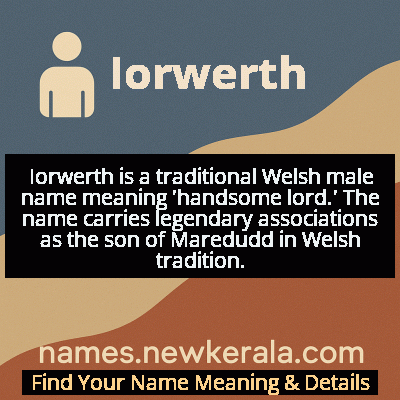Iorwerth Name Meaning & Details
Origin, Popularity, Numerology Analysis & Name Meaning of Iorwerth
Discover the origin, meaning, and cultural significance of the name IORWERTH. Delve into its historical roots and explore the lasting impact it has had on communities and traditions.
Name
Iorwerth
Gender
Male
Origin
Lucky Number
8
Meaning of the Name - Iorwerth
Iorwerth is a traditional Welsh male name meaning 'handsome lord.' The name carries legendary associations as the son of Maredudd in Welsh tradition.
Iorwerth - Complete Numerology Analysis
Your Numerology Number
Based on Pythagorean Numerology System
Ruling Planet
Saturn
Positive Nature
Ambitious, efficient, realistic, and authoritative.
Negative Traits
Materialistic, stressed, confrontational, and can be overly ambitious.
Lucky Colours
Dark blue, black.
Lucky Days
Saturday.
Lucky Stones
Blue sapphire, amethyst.
Harmony Numbers
2, 4, 6.
Best Suited Professions
Business leaders, managers, financial services, law enforcement.
What People Like About You
Leadership, determination, organizational skills.
Famous People Named Iorwerth
Iorwerth ap Maredudd
Welsh nobleman
Lord of Caerleon and ancestor of prominent Welsh noble families
Iorwerth Drwyndwn
Welsh prince
Son of Owain Gwynedd, father of Llywelyn the Great
Iorwerth Peate
Museum curator and folklorist
Founder of the Welsh Folk Museum at St Fagans
Iorwerth Jones
Rugby player
Welsh international rugby union player in the 1920s
Name Variations & International Equivalents
Click on blue names to explore their detailed meanings. Gray names with will be available soon.
Cultural & Historical Significance
In Welsh mythology and the Mabinogion, names similar to Iorwerth appear in tales of heroic figures, connecting the name to Wales' rich oral tradition. The name's persistence through centuries demonstrates the resilience of Welsh culture despite English domination. During the 19th and 20th century Celtic revival, Iorwerth gained renewed importance as a symbol of authentic Welsh identity, representing continuity with the pre-conquest Welsh nobility. Today, it stands as a marker of cultural pride and historical consciousness, particularly in Welsh-speaking communities where traditional names serve as living connections to Wales' distinctive heritage and language.
Extended Personality Analysis
Individuals named Iorwerth typically exhibit a combination of traditional values and natural leadership qualities that reflect the name's noble heritage. They often possess a strong sense of identity and connection to their roots, whether cultural, familial, or community-based. The 'handsome lord' meaning frequently manifests as a dignified presence and charismatic bearing that commands respect without being overbearing. These individuals tend to be principled and honorable, with a deep-seated sense of responsibility toward those in their care or community.
Iorwerths are often intellectually curious with a particular interest in history, tradition, and cultural preservation. They may display a quiet confidence rather than overt assertiveness, preferring to lead through example and wisdom rather than force. Their loyalty to family and tradition is typically strong, and they often serve as keepers of family history or cultural knowledge. While they respect established ways, they're not necessarily conservative—many Iorwerths balance tradition with innovation, particularly when working to preserve or revitalize cultural heritage. They tend to be perceptive judges of character and situations, possessing the wisdom suggested by their connection to historical Welsh rulers and noble figures.
Modern Usage & Popularity
In contemporary usage, Iorwerth remains a distinctly Welsh name that has experienced a modest revival as part of the broader Celtic cultural resurgence. While it never ranks among the most popular names in Wales, it maintains consistent usage particularly in Welsh-speaking areas like Gwynedd, Ceredigion, and Carmarthenshire. The name is rarely encountered outside Wales, making it a strong marker of Welsh identity and cultural affiliation. In recent years, there's been increased interest in traditional Welsh names among both Welsh-speaking and English-speaking Welsh families, leading to gradual growth in Iorwerth's usage. It's considered a sophisticated, historically significant choice that connects the bearer to Wales' medieval past while remaining distinctive in the modern era. The name is most commonly used in families with strong Welsh heritage or those actively engaged in Welsh cultural and linguistic preservation.
Symbolic & Spiritual Meanings
Symbolically, Iorwerth represents the ideal fusion of noble leadership, cultural continuity, and aesthetic harmony. The name embodies the Celtic concept where physical beauty reflects inner virtue and rightful sovereignty, suggesting that true leadership arises from moral integrity as much as from birthright or power. It symbolizes the enduring connection between past and present, serving as a living link to Wales' medieval princes and the nation's struggle for identity. The name carries the symbolic weight of heritage preservation and cultural resistance, representing the determination of Welsh culture to maintain its distinctiveness despite historical pressures. As a name that means 'handsome lord,' it also symbolizes the ideal balance between strength and beauty, authority and compassion, tradition and progress—qualities that define effective and respected leadership across cultures and eras.

